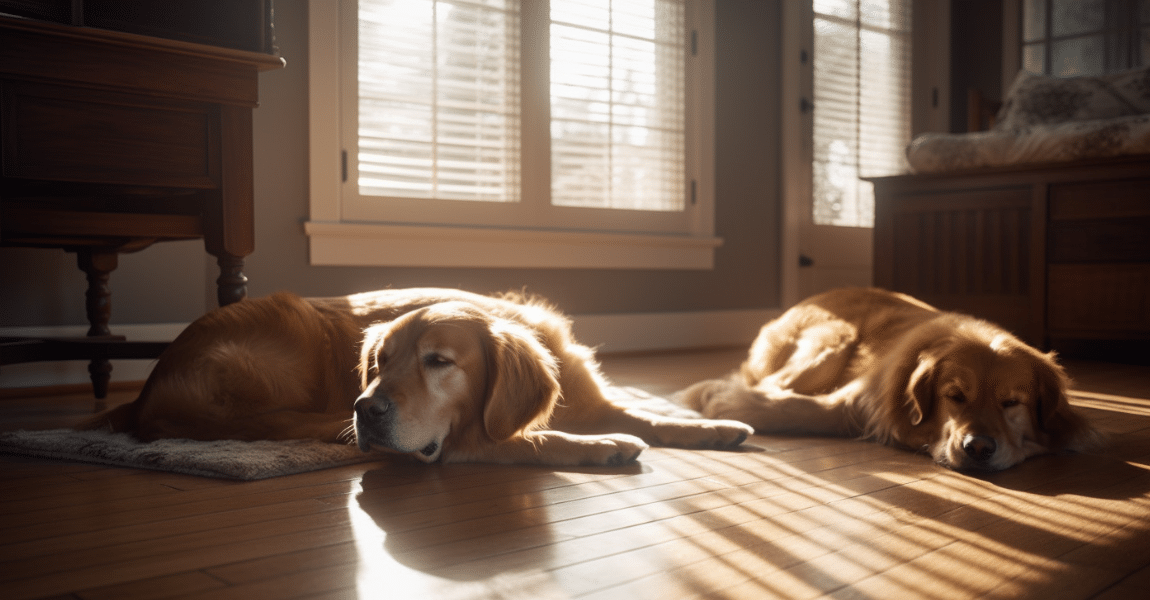If you have pets, then you know accidents can happen. And when those accidents happen on hardwood floors, it can be a real headache. Not only can pet urine leave an unpleasant odor, but it can also cause damage to your hardwood flooring if not taken care of promptly.
Luckily, there are steps you can take to remove pet urine stains from your hardwood floors and prevent future accidents from happening.
In this article, we will guide you through the process of identifying and locating pet urine stains, removing fresh and set-in pet urine stains from hardwood floors, and using natural cleaning solutions to get rid of the stains and odors. We will also share some tips on how to prevent future pet urine accidents on your hardwood floors.
By following these steps, you can restore the beauty of your hardwood floors and keep them looking great for years to come.
Identifying and Locating Pet Urine Stains
You’ll want to get down on your hands and knees and sniff around for any hidden pet urine stains, because even if you can’t see them, your nose will lead you to them. Look for discoloration or warping on the hardwood floor.
If you’re still having trouble locating the stain, try using a black light. Pet urine stains will glow under a black light, making it easier to see where the stain is located.
Once you’ve located the pet urine stain, it’s important to use the right cleaning solution to remove it. Enzyme cleaners are a great option for hardwood floors because they break down the proteins in pet urine, eliminating both the stain and the odor. Be sure to follow the instructions on the cleaner carefully, as some cleaners require that you blot up the excess urine before applying the solution.
If you don’t have access to an enzyme cleaner, you can try mixing equal parts water and white vinegar to create a cleaning solution. Apply the solution to the stain and let it sit for 10-15 minutes before blotting it up with a clean cloth.
Avoid using harsh chemicals or abrasive tools on hardwood floors, as they can damage the finish and make the stain worse. With a little patience and the right cleaning solution, you can successfully remove pet urine stains from your hardwood floors.
Removing Fresh Pet Urine Stains from Hardwood Floors
If your furry friend has an accident on your beautiful wooden surface, simply blot the affected area with a clean cloth and apply a mixture of vinegar and water to effectively remove the stain and odor. The vinegar and water solution is a natural and effective way to break down the enzymes in the urine, making it easier to remove.
Mix equal parts of white vinegar and water and apply it to the affected area. Be sure to let it sit for a few minutes before using a clean cloth to blot it dry.
Using enzymatic cleaners is another option for removing pet urine stains from hardwood floors. These cleaners contain enzymes that break down the proteins in urine, which is what causes the smell. Enzymatic cleaners are specifically designed to eliminate pet urine stains and odors, making them a go-to solution for pet owners.
Be sure to follow the instructions on the label and allow the cleaner to sit on the affected area for the recommended amount of time.
If you’re struggling with lingering smells after removing the stain, odor neutralizers can help combat the unpleasant scent. These products work by breaking down the molecules that cause the odor, leaving your hardwood floors smelling fresh and clean.
Baking soda is a natural odor neutralizer that can be sprinkled on the affected area and left to sit for a few hours before being vacuumed up. Alternatively, you can use a commercial odor neutralizer specifically designed for pet urine stains. Apply the product according to the instructions on the label, and enjoy a pet odor-free home.
Treating Old or Set-In Pet Urine Stains on Hardwood Floors
Dealing with stubborn stains left by your furry friend’s accidents on your beautiful wooden surface can be a real challenge, but don’t worry, there are effective solutions for treating old or set-in marks.
One of the most effective techniques is the sandpaper technique. This technique involves sanding down the affected area of the floor to remove the damaged layer. Sanding should be done gradually, starting with a coarse grit sandpaper and finishing with a finer grit. Once the damaged layer has been removed, the area can be refinished to match the rest of the floor.
If the sandpaper technique seems too daunting or risky, you can always opt for professional cleaning services. Professional cleaners have the equipment and expertise to remove even the toughest pet urine stains from hardwood floors. They use specialized products and methods to clean and sanitize the affected area.
Hiring a professional may be more expensive than doing it yourself, but it may be worth it if you want to ensure that the stain is completely removed and your floor is restored to its original condition.
Removing old or set-in pet urine stains from hardwood floors requires patience, persistence, and the right techniques. Whether you choose to do it yourself with the sandpaper technique or hire professional cleaning services, the key is to act quickly and not let the stain set in for too long.
With the right approach, your hardwood floors can be restored to their original beauty and your furry friend can continue to enjoy them without leaving any unsightly stains.
Natural Cleaning Solutions for Pet Urine on Hardwood Floors
Don’t underestimate the power of natural cleaning solutions when it comes to maintaining the beauty and cleanliness of your hardwood floors from pet accidents. DIY cleaning recipes are an effective and affordable way to get rid of pet urine stains without exposing your pets and family to harmful chemicals. Plus, using eco-friendly options can help reduce your carbon footprint and promote a healthier environment.
One of the most popular DIY cleaning recipes for pet urine on hardwood floors involves using a mixture of water, vinegar, and baking soda. First, you need to blot up as much of the urine as possible with a clean cloth or paper towel. Then, mix equal parts of water and vinegar in a spray bottle and spray the affected area. Let the solution sit for a few minutes, then sprinkle baking soda over the area and let it sit for another ten minutes. Finally, use a damp cloth to wipe away the baking soda and vinegar solution.
Another eco-friendly option is using hydrogen peroxide and dish soap. This recipe is especially effective for tackling old or set-in pet urine stains. Mix one cup of hydrogen peroxide with a tablespoon of dish soap and a tablespoon of baking soda. Apply the mixture to the stained area and let it sit for about 15 minutes. Then, wipe away the solution with a damp cloth and rinse the area with water. This recipe works well on hardwood floors and is safe for pets and humans alike.
Preventing Future Pet Urine Accidents on Hardwood Floors
To prevent future accidents, you should start by establishing a regular routine for taking your furry friend outside. This means setting a schedule that works for both you and your pet, and sticking to it as much as possible. Consistency is key when it comes to training pets, so make sure you take your pet outside at the same times every day, and reward them for going potty outside.
Another way to prevent future accidents is to invest in floor protectors. These can be mats or rugs that are placed in areas where your pet is most likely to have an accident, such as near the front door or in their favorite spot to nap. Floor protectors can help to absorb any urine and protect your hardwood floors from damage.
It’s important to continue training your pet and reinforcing good behavior. If your pet does have an accident on your hardwood floors, make sure to clean it up right away and use positive reinforcement to encourage them to go potty outside in the future.
With a little patience and persistence, you can help your pet learn to do their business outside and protect your hardwood floors from further damage.
Frequently Asked Questions
Can I use bleach to remove pet urine stains from hardwood floors?
Using bleach on hardwood floors can cause discoloration and damage. There are hardwood safe cleaners and bleach alternatives that can be used to remove pet urine stains without causing harm to your floors.
How long does it take for pet urine to cause damage to the hardwood floor?
If left untreated, pet urine can cause damage to hardwood floors within a few hours. Preventive measures include immediate cleanup and using pet-friendly cleaning solutions. Different types of pet urine can have varying effects, with cat urine being the most damaging.
What is the best way to remove the smell of pet urine from hardwood floors?
To remove pet urine odor from hardwood floors, clean the area thoroughly with a mixture of vinegar and water. Use baking soda to absorb any remaining moisture and odor. Prevent future stains by quickly cleaning up any accidents and considering a protective coating.
Will using a steam cleaner damage my hardwood floors when removing pet urine stains?
When it comes to Steam Cleaner Safety, it’s important to use caution on hardwood floors. While steam can be effective for removing pet urine stains, alternative cleaning methods may be safer to avoid damaging the wood.
Can I use vinegar to clean pet urine stains from my hardwood floors?
Yes, vinegar can be an effective alternative product for cleaning pet urine stains on hardwood floors. Dilute it with water and apply it to the affected area. There are several cleaning techniques you can use, such as blotting and scrubbing, to remove the stain.
Conclusion
Congratulations! You’ve successfully tackled the issue of pet urine on your hardwood floors. By following the steps outlined in this article, you were able to identify and locate pet urine stains, remove fresh stains, and treat old or set-in stains.
You’ve also learned about natural cleaning solutions that are safe for your hardwood floors and effective in removing pet urine stains. However, prevention is always better than cure.
By taking proactive measures to prevent future pet urine accidents, you can save yourself the hassle of cleaning up the mess and prolong the life of your hardwood floors. This includes properly training your pets, providing them with adequate space and resources, and regularly cleaning and maintaining your hardwood floors.
By doing so, you can enjoy a clean and hygienic living space without worrying about pet urine stains on your hardwood floors.


